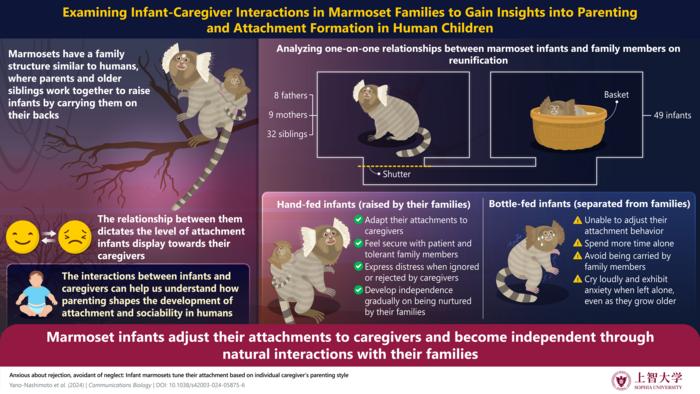A new study led by researchers from Sophia University and RIKEN Center for Brain Science has shed light on how parenting influences attachment formation and child development. The study, published in the journal Communications Biology, used common marmosets, small monkeys native to South America, as a model for human attachment. Marmosets have a family structure similar to humans, where the father, mother, and older siblings take turns caring for the cubs.
“Marmoset babies change their attachment behavior depending on their caregivers. Such relationships with families during early childhood are thought to influence the development of attachment and independence, and are expected to provide hints about the development and independence of human children,” explains Associate Professor Atsuko Saito from Sophia University.
Infants Adapt to Caregiver’s Parenting Style
The researchers observed the interaction between marmoset infants and their caregivers during reunification. They found that infants call out for attention and prefer clinging to the backs of familiar caregivers, such as their parents. When caregivers were patient and attentive, infants stopped calling out once they were picked up. However, the infants avoided intolerant and insensitive caregivers, and when picked up by rejecting caregivers, they continued to call out for attention.
This adaptable attachment behavior was not observed in cubs that were separated from their families in infancy and reared artificially. These cubs avoided their caregivers, tended to stay alone, and continued to cry out for care. Cubs raised by their families gradually decreased their calls as they grew older, while artificially reared cubs continued to cry out and seek assistance, even after the second month after birth, indicating a slower development of independence.
Family’s Role in Fostering Independence
The study highlights the crucial role of families in fostering independence in infants. “These findings show that in marmosets, which have a family structure similar to humans, offspring flexibly change their attachment depending on the family’s parenting style, and that the offspring acquires the ability to become independent while being nurtured within the family,” explains Dr. Saito.
The results suggest that infants can feel equally secure and form strong attachments with supportive caregivers other than their mothers. This indicates that other family members can play an active role in caring for the child, easing the responsibilities placed on mothers. Infants become more independent through their interactions with the family.
The researchers are currently studying how attachment formation and experiencing attachment disorders affect brain development in marmosets. They aim to use these findings to contribute towards the improvement of parenting practices and childcare in humans. The study emphasizes the importance of responsive and attentive parenting in fostering secure attachments and healthy emotional development in children.

